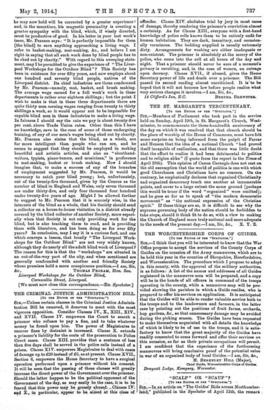THE CRIMINAL JUSTICE ADMINISTRATION BILL. [To 'HZ EDITOR OR THE
°SPECTATOR...1 SIB,—Unless certain clauses in the Criminal Justice Adminis- tration Bill be removed, it deserves to meet with the most vigorous opposition. Consider Clauses IV., X., XIII., XIV., and XVII. Clause IV. empowers the Court to search a prisoner who refuses to pay a fine, and to take whatever money be found upon him. The power of Magistrates to recover fines by distraint is increased. Clause X. extends a prisoner's liability for the costs of the prosecution to Police Court cases. Clause XILL provides that a sentence of less than five days shall be served in the police cells instead of a prison. Clause XIV. empowers Magistrates to deal with muses of damage up to E20 instead of £5, as at present. Clause XVII., Section 6, empowers the Home Secretary to have a surgical operation performed upon a prisoner without his consent. It will be seen that the passing of these clauses will greatly increase the direct power of the Government over the prisoner. Should the latter happen to be the political opponent of the Government of the day, as may easily be the case, it is to be feared that this power may, be grossly abused. Clauses IV: and X., in particular, appear to be aimed at this class of offender. Clause XIV. abolishes trial by jury in most cases of damage, thereby rendering the prisoner's conviction almost a certainty. As for Clause XIII., everyone with a first-band knowledge of police cells knows them to be entirely unfit for human habitation. They are dark, insanitary, and occasion- ally verminous. The bedding supplied is usually extremely dirty. Arrangements for washing are either inadequate or non-existent. The prisoner is absolutely at the mercy of the police, who come into the cell at all hours of the day and night. That a prisoner should never be sure of a moment's privacy is revolting, and, in the case of women, an outrage upon decency. Clause XVII., if abused, gives the Home Secretary power of life and death over a prisoner. The Bill passed its second reading almost uncriticized. It lite be hoped that it will not become law before people realize what very serious changes it involves—I am, Sir, Ac.,














































 Previous page
Previous page